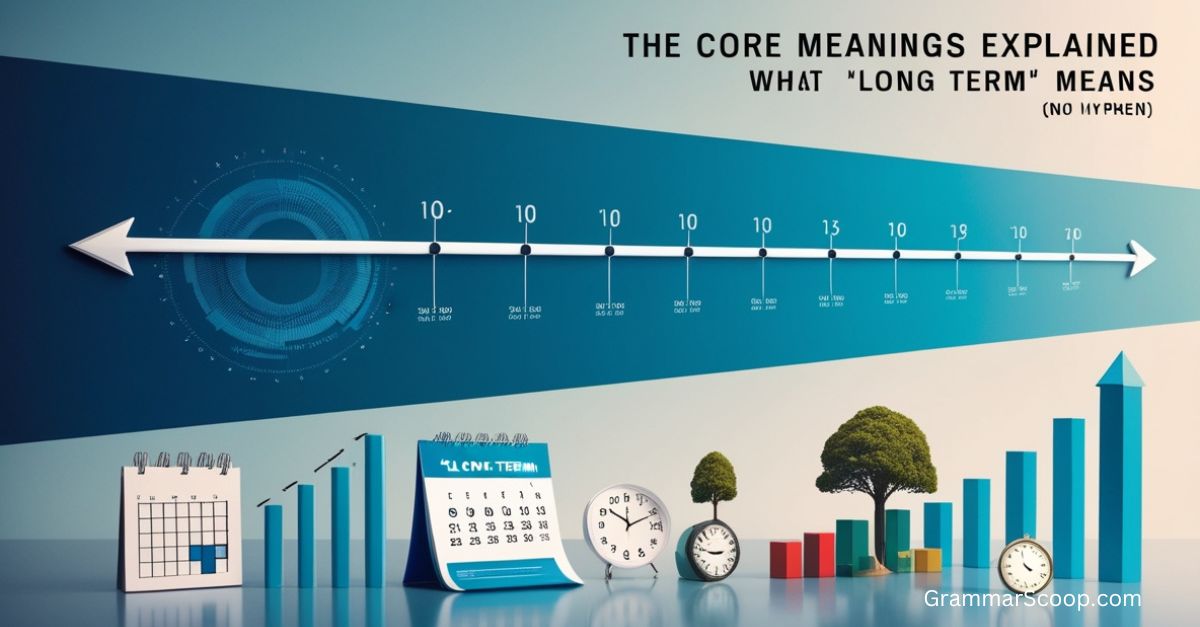Ever found yourself typing “long term” in a sentence, only to wonder if you should have hyphenated it? You’re not alone. In the world of grammar and style, the question “is long term hyphenated” continues to confuse writers, editors, students, and professionals alike. The difference might seem minor, but it can significantly impact how clearly your writing communicates.
This post dives deep into the “longterm or long-term” debate, breaking down when to hyphenate, why it matters, and how to never second-guess yourself again.
Quick Summary
The difference between long term and long-term comes down to grammar. Use “long-term” with a hyphen when it’s an adjective (e.g., long-term goals). Use “long term” without a hyphen when it’s a noun phrase (e.g., in the long term). The hyphen helps clarify meaning and follows standard writing conventions. Understanding when and why to hyphenate ensures clarity and consistency in your writing.
The Real Reason for the Confusion
Let’s get straight to it: grammar rules and style guides don’t always agree. Add to that the influence of modern digital writing, and you’ve got a recipe for confusion.
Why this matters:
- Different style guides have different rules.
- Digital platforms often skip grammar checks.
- Many confuse compound nouns and compound adjectives.
Example:
- “We are planning for the long term.”
- “We need a long-term plan.”
Both are correct, but they use the phrase differently. Let’s break it down.
The Core Meanings Explained
What “Long Term” Means (No Hyphen)

When written without a hyphen, “long term” is typically used as a noun phrase. It represents a period of time that stretches into the future. It doesn’t directly describe another noun; it stands alone.
Usage Examples:
- “The investment will benefit us in the long term.”
- “She’s focused on her career over the long term.”
Key Traits:
- Acts as a noun.
- Usually follows prepositions like “in,” “over,” or “for.”
Pro Tip: If the phrase can be replaced with “eventually” or “over time,” you’re probably safe using “long term” without a hyphen.
What “Long-Term” Means (With Hyphen)
When hyphenated, “long-term” functions as a compound adjective. It modifies a noun that comes immediately after.
Usage Examples:
- “They implemented a long-term strategy.”
- “This is not a long-term commitment.”
Key Traits:
- Acts as an adjective.
- Appears before a noun.
If the phrase directly describes a noun, always hyphenate it. That’s the core of the rule.
When to Use Which: A Rule You Can Trust
Here’s a simple test you can use every time:
- Before the noun? Use long-term with a hyphen.
- Standing alone or after a verb/preposition? Use long term without the hyphen.
Still confused? Use this rule-of-thumb checklist:
- Correct: “They are preparing for the long term.”
- Correct: “They created a long-term solution.”
- Wrong: “They created a long term solution.”
Side-by-Side Comparison
| Feature | Long Term (noun phrase) | Long-Term (adjective) |
|---|---|---|
| Function | Noun phrase | Adjective |
| Placement | After verb/preposition | Before a noun |
| Example | “In the long term, it’s worth it.” | “A long-term contract is needed.” |
| Hyphenated? | No | Yes |
| Replaceable with “eventually” | Often | No |
Read More:
- Of Course or Ofcourse: Which One Should You Use?
- Pre vs Post: Which Prefix to Use and Why It Matters
- Writting or Writing: Never Get Confused Again
- Hoody or Hoodie? Choosing the Right Spelling
Common Mistakes and Misconceptions
Grammar software often misses subtle hyphenation issues. And many online writers assume hyphenation is just a matter of style. But if you mix up the two, your writing can look sloppy or confusing.
Common Errors:
- Wrong: “He signed a long term agreement.”
- Right: “He signed a long-term agreement.”
Reader Impact:
- Without the hyphen, the sentence feels clunky.
- With it, clarity improves instantly.
Quote to remember:
“Hyphens aren’t just decoration. They signal how words relate.” — Grammar Girl (Mignon Fogarty)
Contextual Examples That Clarify Everything
Real Sentences Using “Long Term”
- “They invested in real estate for the long term.”
- “In the long term, success depends on consistency.”
Real Sentences Using “Long-Term”
- “A long-term plan will ensure sustainability.”
- “She was hired for a long-term research project.”

These examples show that placement in the sentence drives the correct form.
Synonyms That Work (and When to Use Them)
Sometimes, repeating “long-term” or “long term” gets clunky. Here are alternatives to keep your writing fresh.
Alternatives to “Long Term” (Noun)
- Duration
- Future
- Extended period
- Timeline
Example:
- “In the future, this might change.”
- “Over an extended period, the data improved.”
Alternatives to “Long-Term” (Adjective)
- Prolonged
- Sustained
- Extended
- Enduring
Example:
- “A sustained campaign led to results.”
- “An enduring partnership was formed.”
Note: Choose synonyms that match the formality and tone of your writing.
The Grammar Behind It: Hyphenation 101
Compound modifiers are pairs (or groups) of words that work together to describe a noun. When placed before the noun, they’re usually hyphenated.
Similar Examples:
- well-known author
- high-quality material
- long-term investment
Rule: If two words together describe a noun and appear before it, they require a hyphen.
Without the noun? No hyphen needed.
Why it matters:
The hyphen creates clarity.
Compare:
- “She is a small business owner.” (She owns a small business)
- “She is a small-business owner.” (She owns a small business, not that she’s small herself!)
What Style Guides Actually Say
| Style Guide | Rule on “long-term” | Example |
|---|---|---|
| AP Style | Hyphenate before nouns only | “A long-term goal” |
| Chicago Manual | Hyphenate as adjective only | “A long-term contract” |
| APA Style | Favors hyphen with modifiers | “Long-term outcomes were studied.” |
| MLA Style | Follows standard grammar | “They worked in the long term.” |
Word Origins and Evolution
Where “Term” Comes From
The word “term” traces back to the Latin terminus, meaning a boundary, limit, or defined time. In English, “term” has long been used to define timeframes, such as “term limits,” “school term,” or “loan term.”
Evolution of “Long-Term” as a Concept

The phrase “long-term” emerged prominently in early 20th-century finance and economics. As corporate planning and investments grew, the need to distinguish between “short-term” and “long-term” strategies became essential.
First Known Use: The Oxford English Dictionary traces “long-term” as a compound adjective to 1904 in an economic report.
Final Verdict: So, Which Should You Use?
Still wondering whether it’s longterm or long-term? Let’s make it crystal clear.
Use long-term (with a hyphen):
- When it modifies a noun.
- Appears before the noun.
- “A long-term commitment,” “long-term benefits.”
Use long term (no hyphen):
- When used as a standalone noun phrase.
- Typically after prepositions or verbs.
- “For the long term,” “in the long term.”
Never Use:
- Longterm (as one word) — it’s incorrect in formal and professional writing.
Grammar isn’t about being rigid. It’s about being understood. And a simple hyphen makes all the difference.
Quick Checklist for Writers
- Does the phrase describe a noun that follows? Use long-term.
- Does the phrase stand alone? Use long term.
- Need a shortcut? Replace it with “over time.” If it works, it’s probably long term.
- Avoid “longterm” altogether.
Whether you’re writing emails, reports, articles, or blog posts, understanding the difference between long term or long-term gives your writing clarity, professionalism, and polish.
Now you won’t just guess—you’ll know exactly what to do.

Lisa Morris is a seasoned blogger and language enthusiast with a passion for making grammar simple and engaging. At Grammar Scoop, she shares clear, concise tips that help readers master the rules of English with confidence.






